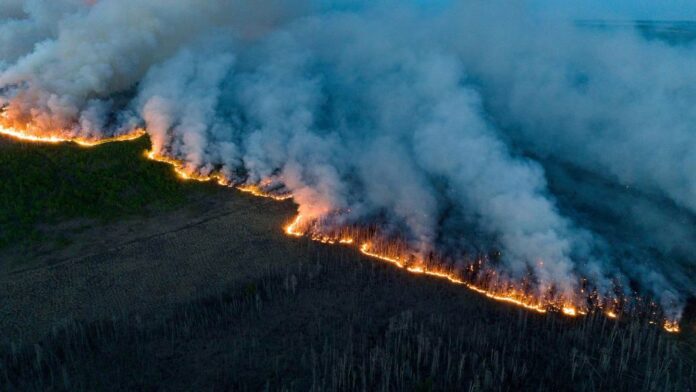Introduction
Canada is currently facing an unprecedented wildfire season, marked by devastating consequences for its landscape, communities, and environment. The nation’s firefighters are grappling with a crisis of unprecedented magnitude, battling massive fires that are becoming larger, hotter, and more frequent. Tens of thousands of people have been displaced, and millions are choking on toxic wildfire smoke. As this crisis unfolds, it’s becoming evident that the coming years could bring even more challenges.
Escalating Infernos
Canadian firefighter Scott Rennick, an experienced commander, anticipated a tough summer in 2023. He led a specialized incident management team responsible for tackling the most complex fires in British Columbia. However, the situation quickly escalated when a human-caused fire erupted in Fort Saint John. Driven by drought and wind, the blaze spread rapidly, consuming thousands of acres in a matter of hours. This marked the beginning of what would become a devastating wildfire season.
Interconnected Factors Fueling the Crisis
The factors contributing to these catastrophic fires are interconnected. A warming world has led to drier landscapes, making fuels more susceptible to ignition. Lightning, often a result of increased thunderstorms, has become a primary catalyst for igniting fires, especially in remote areas that are difficult to monitor. The situation is exacerbated by the changing climate, transforming once remote fires into larger, more destructive infernos.
Smoke Signals: Environmental and Health Impacts
The impact of these fires extends beyond Canada’s borders. The massive plumes of smoke generated by the wildfires have emitted staggering amounts of carbon dioxide, making Canada one of the world’s top polluters. This toxic smoke has engulfed North America, reaching as far as Europe. The health risks are immense, particularly for those living in densely populated areas where air quality levels have reached unprecedented heights.
International Assistance and Overwhelmed Resources
The urgency of the situation has forced Canada to seek international assistance, as its own firefighting capabilities are stretched to their limits. However, even with the aid of foreign firefighters, the challenges remain immense. The lack of a nationwide strategy, funding, and political willpower has hindered effective wildfire management. A patchwork of provincial and territorial agencies struggles to coordinate efforts, resulting in overwhelmed resources and exhausted crews.
The Call for Comprehensive Solutions
The crisis has ignited discussions about the need for a national firefighting service and a dedicated emergency management agency. Canada is grappling with the reality that wildfires have become a year-round threat, pushing its firefighting capabilities to the brink. The importance of controlled burns and proactive fire management is being recognized, although these strategies can be politically challenging due to their impact on recreational activities and urban development.
Indigenous Wisdom: A Path Forward
As Canada grapples with the unprecedented challenge of combating massive wildfires, an unlikely source of solutions is emerging from the heart of the devastation: Indigenous knowledge and practices. For centuries, Indigenous communities across the country have maintained a deep understanding of the intricate relationships between fire, land, and ecosystems. As the crisis escalates, the significance of their wisdom is becoming increasingly apparent.
Holistic Fire Management
Indigenous communities have traditionally recognized fire as a natural and essential force for maintaining balanced ecosystems. They have long utilized controlled burns to clear underbrush, encourage the growth of specific plants, and regenerate landscapes. These intentional fires are carefully planned and executed during times of low risk, ensuring that they contribute positively to the environment.
Cultural Connection and Stewardship
For Indigenous peoples, fire is not just a tool; it’s a cultural heritage deeply intertwined with their way of life. Fire management is a sacred responsibility that involves a profound understanding of the land’s needs and cycles. Elders and knowledge keepers pass down this wisdom through generations, preserving not only ecological practices but also the cultural significance of fire in their communities.
Collaborative Restoration
Recognizing the value of Indigenous knowledge, collaborative efforts are underway to integrate traditional burning practices into modern wildfire management strategies. These collaborations involve partnerships between Indigenous communities, government agencies, and scientific experts. The goal is to combine ancient wisdom with contemporary science, creating a holistic approach that respects both cultural traditions and ecological realities.
Challenges and Opportunities
However, this path forward is not without challenges. The suppression of Indigenous fire practices over generations by colonial authorities has led to a loss of expertise in some communities. Rebuilding this knowledge base requires resources, training, and support. Additionally, integrating traditional practices into mainstream wildfire management requires overcoming bureaucratic obstacles and fostering mutual respect between Indigenous and non-Indigenous stakeholders.
Promising Steps
Despite these challenges, progress is being made. Initiatives led by Indigenous leaders and supported by governmental and non-governmental organizations are working to revive cultural burning practices. These initiatives are not only restoring the land’s health but also empowering Indigenous communities to reclaim their stewardship role in the face of environmental crises.
A Hopeful Future
The incorporation of Indigenous wisdom into wildfire management is more than a practical solution—it’s a step toward reconciliation, healing, and sustainable coexistence with the land. As Canada confronts the escalating inferno of wildfires, Indigenous practices offer a beacon of hope and resilience. The restoration of cultural burning practices not only benefits the environment but also celebrates the rich heritage and wisdom of Indigenous peoples.
Urgent Need for a Unified Approach
The urgency of the situation is clear: Canada needs a comprehensive plan to combat these unprecedented wildfires. The current crisis is an alarming wake-up call, highlighting the need for immediate action, adequate funding, and a collaborative approach that brings together Indigenous wisdom, scientific expertise, and government resources. As Canada battles this inferno, the world watches, recognizing that the threat of wildfires is not confined to one nation—it’s a global challenge that demands swift and unified solutions.










